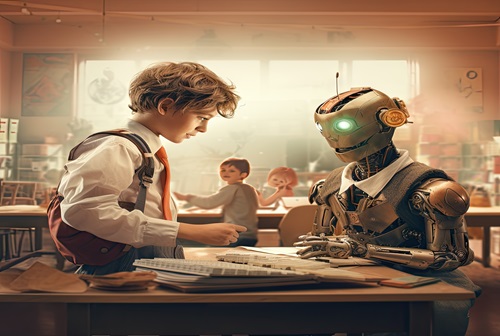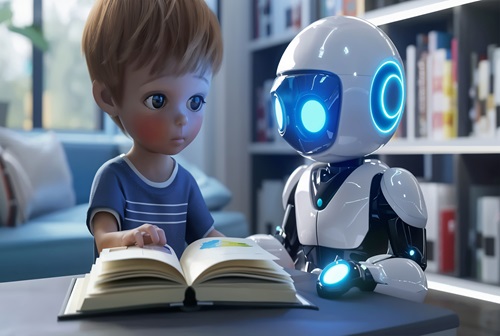Artificial Intelligence in Education
Have you ever wished for a super-smart robot teacher who knows exactly what you need to learn? Well, that dream is becoming real thanks to Artificial Intelligence in Education. Let’s dive into this exciting world and see how AI is making learning more fun, easier, and better for students everywhere.
1 - What is AI and Why Should Students Care?
AI is like a computer brain that can think, learn, and solve problems. It’s already in our phones, cars, and homes. Now, it’s coming to our schools too! Here’s why students should be excited:
- AI can make learning more fun and interesting
- It helps teachers give extra attention to each student
- AI tools can make homework and studying easier
- It prepares students for a future world full of AI
2 - Cool AI Tools in the Classroom
Let’s look at some awesome AI tools that are changing how we learn: Fun facts of Artificial Intelligence in Education.
- Smart Tutors: These AI programs can help you with math, science, and other subjects. They adapt to your learning style and give you practice problems at just the right level.
- Writing Assistants: Stuck on an essay? AI writing tools can help you brainstorm ideas, check your grammar, and even suggest better words to use.
- Language Learning Apps: Want to learn a new language? AI-powered apps can listen to your pronunciation, give you personalized lessons, and even chat with you in the language you’re learning.
- Virtual Reality (VR) Field Trips: Imagine visiting ancient Rome or exploring the inside of a volcano – all from your classroom! AI and VR can make this happen.
- Smart Content Creators: These AI tools can turn textbooks into fun quizzes, videos, and games.
3 - How does AI Help Teachers?
Teachers are superheroes, and AI is like their new superpower! Here’s how Artificial Intelligence in Education is going to impact the learning world.
- Grading Help: AI can grade multiple-choice tests and even some written answers, giving teachers more time to help students.
- Lesson Planning: AI suggests fun activities and materials based on what students need to learn.
- Spotting Troubles: AI can notice if a student is struggling and alert the teacher early.
- Personalized Learning: AI helps teachers create custom lessons for each student’s needs.

4 - The Magic of Personalized Learning
Imagine if your textbook could change based on how you learn best. That’s what Artificial Intelligence in Education can do! We call this personalized learning. Here’s a simple table to show how it works:
| Traditional Learning | AI Personalized Learning |
|---|---|
| Same textbook for all | Adapts content to each student |
| Fixed pace for everyone | Students learn at their own speed |
| One-size-fits-all lessons | Lessons match student interests |
| Limited feedback | Constant, helpful feedback |
5 - AI and Special Education
Artificial Intelligence in Education is a game-changer for students with special needs. It can:
- Help non-verbal students communicate using eye movements or brain signals
- Turn spoken words into text for deaf students
- Read text aloud for students with dyslexia
- Provide extra practice for students with learning disabilities
6 - The Future of AI in Schools
Get ready for some mind-blowing changes in education! Here’s what experts think we’ll see soon:
- AI Teaching Assistants: Imagine having a friendly AI helper answer your questions 24/7. That’s how Artificial Intelligence in Education is gonna boost your learning experience.
- Smart Classrooms: Rooms that adjust lighting, temperature, and even desk heights to help you focus better.
- Emotion Recognition: AI that can tell if you’re confused, bored, or excited and adjust the lesson accordingly.
- Holographic Teachers: 3D projections of expert teachers from around the world in your classroom!
- Brain-Computer Interfaces: Devices that can help you learn while you sleep or upload information directly to your brain (okay, this one’s pretty far out, but who knows?).
7 - Challenges and Concerns
Of course, bringing AI into schools isn’t all smooth sailing. There are some things we need to be careful about; otherwise, Artificial Intelligence in Education can not be fully productive.
- Privacy: We need to protect students’ personal information.
- Screen Time: Too much time with computers isn’t good for anyone.
- The Human Touch: We still need real teachers for emotional support and inspiration.
- Fairness: We must make sure all students have equal access to AI tools.
8 - How Students Can Prepare for an AI-Powered World
- Learn the Basics: Take online courses about AI and how it works.
- Use AI Tools: Try out educational AI apps and get comfortable with them.
- Focus on “Human” Skills: AI can’t replace creativity, teamwork, and critical thinking. Work on these!
- Stay Curious: Keep up with AI news and always be ready to learn new things.
- Be a Good Digital Citizen: Learn about online safety, privacy, and responsible tech use.
Conclusion: Embracing the Artificial Intelligence in Education
Artificial Intelligence in Education is like a magic wand that’s making learning more exciting, personal, and effective. While there are challenges to overcome, the benefits are huge. As students, you’re at the forefront of this amazing change. Get ready to learn in ways your parents never imagined!
Remember, Artificial Intelligence in Education is a tool to help you grow, not replace your own amazing brain. So, let’s welcome our new AI learning buddies and get ready for a future full of incredible possibilities
FAQs About Artificial Intelligence in Education
No way! Artificial Intelligence in Education is a helper for teachers, not a replacement. Human teachers are still super important for inspiration, emotional support, and complex teaching.
Right now, some AI tools can be expensive. But many companies are working to make AI education tools cheaper or even free for all schools.
Yes! AI can analyze how you answer questions, how long you take, and even your mouse movements to figure out your learning style.
It depends on how you use it. AI tools that help you learn and understand are usually okay. But using AI to do your work for you is not cool. Always check with your teacher!
You’ll still need to know some basic facts. But with AI, schools might focus more on teaching you how to think critically and solve problems.



3 thoughts on “Artificial Intelligence in Education: 8 fun facts of future learning”
I simply could not leave your website before sugtgesting that I
extremely enjoyed the standard info a perrson provide to your visitors?Is going to be
again continuously in order to inspect new posts https://yaninagames.com/
I simply coulld not leave your website before suggesting that I extremely enjoyed the standard info a person provide to your visitors?
Is going to be again continuously in order to inspect
new posts https://yaninagames.com/
Thank you very much for appreciating our work. We’ll keep trying to provide state-of-the-art content.